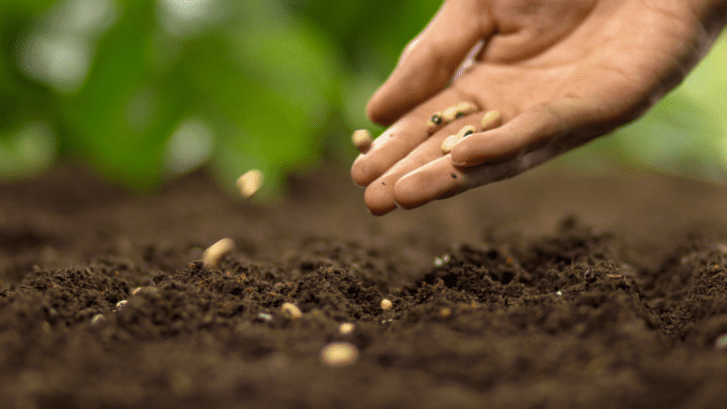Today, we have a sower who went out to sow seeds. According to the parable, he wasn’t very careful. He tosses the seeds wildly, helter skelter. All over they fall on exposed soil. First rocky, thorn choked soil and then, almost by accident rich soil. It all seems like a waste. So often life is like that, so much effort, so little results, so much energy and little return.
In everyday life, countless things are wasted. We often resonate with the sower; we sow a perfect wedding and sprout divorce. We plan an honest day’s work and are downsized or outsourced. We sow a faith centered on family and wind up with non-practicing children. We cultivate decency and virtue, and we receive a call in the night.
Like the sower in Jesus’ story, many of us have extravagantly and liberally sown the seeds of our lives. But so often, we find that the weeds have taken over, the other side seems to be winning. How do we handle the mystery of disappointment and waste which we see all around us? Does today’s parable give us direction?
Over fifty years ago, a baby boy was born in a Milwaukee hospital. The baby was blind, mentally challenged and had cerebral palsy. He did not respond to sound or touch, and his parents had abandoned him. The hospital did not know what to do with this child. Then someone remembered May Lemke, a 52-year-old nurse who lived nearby. She had raised five children of her own; she would know how to care for such a baby.
They asked May to take the child saying, “He’ll probably die young.” May responded, “If I take care of this child, he won’t die young and I’ll be happy to take him.” May called the baby Leslie. It was not easy to care for him; his little body had to be massaged every day. She prayed over him and often added tears to her prayers. As Leslie grew, so did May’s problems. She had to keep him tied to a chair to prevent him from falling. The years passed, it was not until Leslie was 16 that May was able to teach him to stand alone.
During this time, Leslie did not respond to her. But still, May loved him and every day prayed for him. She even told him stories about Jesus, although he just stared into the distance. He did seem to listen to music, so May moved the family piano into his room. She took his fingers and showed him how to punch down the keys. But he did not seem to understand. Then one winter night, May awoke to the sound of someone playing Tchaikovsky’s piano concerto.
She shook her husband and asked him to go to the living room to turn off the radio. What he discovered was beyond their wildest dreams. Leslie was sitting at the piano; he was smiling and playing a note-perfect concerto. It was too remarkable to be true; Leslie had never gotten out of bed alone before. He’d never seated himself at the piano before.
He’d never struck a piano key on his own before, now he was playing beautifully. May dropped to her knees and said, “Thank you, God. You did not forget Leslie.” Soon, Leslie began to practically live at the piano. He played classical, country western, ragtime, rock and roll and it was absolutely incredible. All the music May had played him was stored in his brain and was now flowing out through his hands. Doctors described Leslie as a savant. A person who is mentally challenged from brain damage, but extremely talented. They cannot explain this unusual phenomenon, although they have known about it for nearly 200 years.
Leslie’s story figures in our parable. Remember, May Lemke extravagantly sowed the seeds of her love and her prayers for years with no return, no harvest. It took her sixteen years just to get a mute Leslie to stand, but in the end, she saw her harvest.
The point of May’s story and our story is that she was bound to try. For if she didn’t, there would have been less music in the world. And a little of God’s splendor would be hidden. And there, I think, is the direction the parable gave us.
Namely, whatever the success or failure of our efforts, we are compelled as God’s sowers to scatter our seeds of faith, hope and love. Wherever and to whomever we can. And many of us will in fact see the wonderful outcome of our sowing in our children, our family and friends. And so, we continue to play music for those damaged in any way in the hope that there might be a concerto one day.
We may never hear it, but there will be music in the world because of us. A teacher once told me, “A good teacher has got to be in love with the process of planting a seed but cannot need to be around for the harvest.” This is the lesson for today: be in love with the sowing, don’t give up on the sowing and leave the rest to God.


